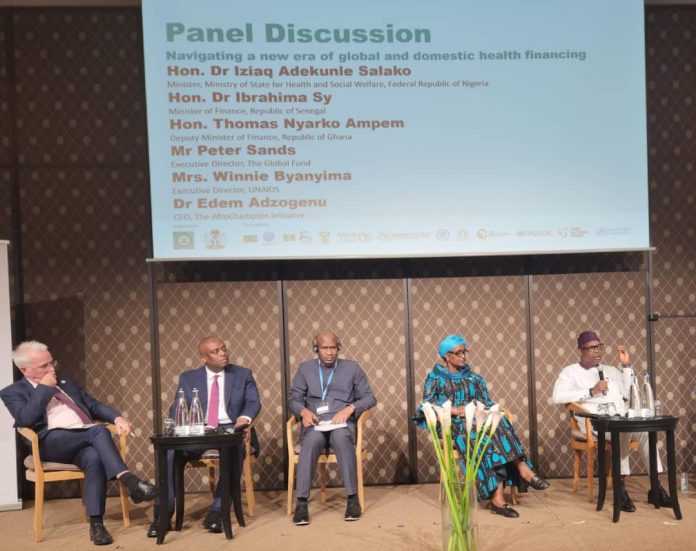By Emmanuella Oghenetega
The Minister of State of the Federal Ministry of Health and Social Welfare, Dr Iziaq Adekunle Salako has in a call for sustainable healthcare investment, reaffirmed Nigeria’s commitment to strengthening domestic health financing as the foundation for achieving Universal Health Coverage (UHC).
He made the statement during a high-level sideline event at the ongoing 78th World Health Assembly (WHA78) in Geneva.
The event was themed: “The Future of Domestic Financing”, and was co-hosted by the Federal Ministry of Health and Social Welfare in collaboration with global health development partners. It brought together health ministers, policymakers, donors, and technical experts to deliberate on strategies for building resilient and equitable health systems in Africa and globally.
Speaking on behalf of the Nigerian government, Dr. Salako emphasized that President Bola Ahmed Tinubu’s administration considered sustainable healthcare financing a national priority. With current out-of-pocket spending on health at a staggering 72%, he said Nigeria was taking bold steps to reverse this trend.
This was contained in a statement signed by Alaba Balogun, Deputy Director, Information & Public Relations
Salako highlighted that central to these reforms was the full implementation of the National Health Act (2014) and the National Health Insurance Authority (NHIA) Act (2022), which together form the legal backbone of Nigeria’s health financing structure. “Under the Health Sector Renewal Investment Initiative, a flagship of the President’s Renewed Hope Agenda, Nigeria is already seeing notable improvements. “
According to the Minister, health insurance coverage had increased by approximately 15% in the past two years, and all 36 states, including the Federal Capital Territory (FCT) have now established their own state health insurance agencies.
“These agencies are instrumental in expanding access to quality health services for the population, especially the most vulnerable,” he noted.
To further protect low-income citizens, the Minister stated that the government has operationalized the Vulnerable Group Fund and eas in the process of establishing a Catastrophic Health Fund to cover high-cost conditions such as cancer and end-stage kidney failure.
To enhance sustainability, Dr. Salako also highlighted new financing mechanisms being introduced to diversify revenue streams for the health sector. These include proposed levies on telecommunications services, sugar-sweetened beverages, tobacco, and alcohol, as well as public health taxes and health impact bonds.
“The autonomy granted to Nigeria’s 774 local government areas through economic reforms by the President has unlocked new opportunities for primary healthcare funding at the grassroots level,” he added.
“The Basic Health Care Provision Fund (BHCPF), which draws 1% from the Consolidated Revenue Fund has been reorganized for more transparency and timeliness in disbursement.
“To ensure efficient resource utilization, Nigeria is adopting a bottom-up budgeting approach, strengthening programme integration, leveraging digital health technologies, and improving tracking of expenditures via the National Health Accounts and resource mapping systems.
“Nigeria is not only focused on mobilizing more funds but also on spending smarter,” Dr. Salako emphasized.
In a significant diplomatic stride, Nigeria has taken a leading role in global advocacy for domestic health financing. At WHA78, Nigeria sponsored a resolution calling on both developed and developing countries to increase domestic investment in health as a key pathway to UHC by 2030.
“Nigeria chaired the consultations for this resolution involving all 194 WHO member states. It received consensus approval from the executive board and will be formally presented tomorrow,” the Minister disclosed.
The resolution also calls for systematic documentation of national health expenditures and stronger collaboration with the World Health Organization (WHO) in tracking and improving health financing globally.
Dr. Salako further highlighted that the Nigerian government has responded to dwindling donor funds, announcing the allocation of an additional $200 million USD in domestic funds to sustain critical public health programmes, including immunization, malaria, tuberculosis, and HIV/AIDS interventions.
“This significant investment reaffirms our resolve to ensure no Nigerian is left behind in accessing essential health services,” he said. “We invite continued partnership, shared learning, and global cooperation to build a healthier, more equitable future for all.”


